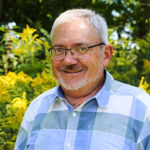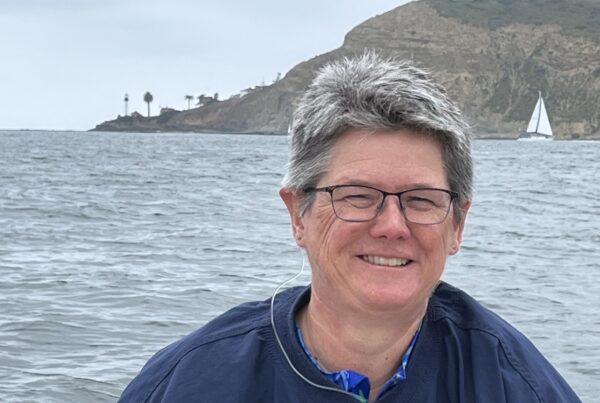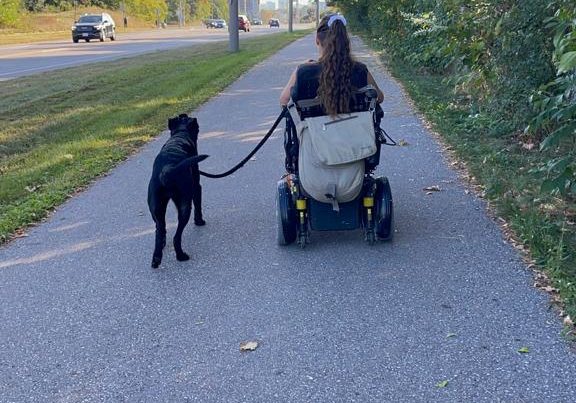L iving with a disability isn’t easy, but I’ve found that living with mine has been far less difficult than changing the damaging ways churches and people think about disability. At age 66, there’s much I’m still learning about how to challenge these attitudes.
As I move into retirement—following 13 years of leading the Disability Concerns ministry for the Reformed Church in America, 15 years as managing editor of the Church Herald, six years as a pastor, and (prior to entering seminary) 10 years as a sportswriter—here are some parting thoughts about the church’s ministry with people with disabilities.
Learn from us and with us
The people who can teach you the most about what disabled people need and want are not medical professionals, church leaders, or those in positions of authority, but disabled people themselves. Speaking as someone with a lifelong disability, we have lots of wisdom, born of necessity and survival, so seek out our perspectives by putting us into spaces where decisions are made and inviting us into leadership roles. Since there are hundreds of types of disabilities—many of them non-apparent or hidden—solicit a wide range of disability perspectives and not just those who, like me, have limited mobility.
Exactly a month before my official retirement date, Judy Heumann died at age 75. As the most influential figure in the disability rights movement over the past 50-plus years, she devoted her life to making the world a better place for everyone through her advocacy and leadership. Even though Heumann used a wheelchair since childhood and had a lifetime of personal experience to draw from, she never stopped learning from other people with disabilities and sharing that with others. She was an unflinching promoter of the independent living philosophy, explaining that “independent living is not doing things by yourself. It is being in control of how things are done.” Independent living is an extension of the disability community’s “nothing about us without us” mantra that resists others making decisions on our behalf without our voice.
The church’s variation on “nothing about us without us” is “everybody belongs, everybody serves.” It’s the vision of the Disability Concerns partnership the Reformed Church in America (RCA) shares with the Christian Reformed Church in North America (CRCNA). Since the Holy Spirit has gifted and called each of us to serve in the body of Christ, don’t just include us to sit on the fringes, but expect contributions from us as well. The paper “Spirituality and Hospitality: What the Church Can Learn by Welcoming Persons with Disabilities,” written by the RCA’s Commission on Theology and approved by the RCA’s General Synod in 2008, was foundational for starting RCA Disability Concerns and remains a timely and instructive document.
Related: Everybody Belongs, Serving Together: inclusive church ministry guide
Ableism is the air we breathe
Ableism is a pervasive, unintentional bias that discriminates against people with disabilities and considers us “less than” (even though most people would never actually say that out loud). It is constantly reinforced in a toxic world that wasn’t designed with us in mind. Ableism isn’t just in the air we breathe, it is the air we breathe. Because it’s everywhere, learning to be anti-ableist requires vigilance.
As I’ve written elsewhere, I was unfamiliar with ableism and how it works when I started my work in Disability Concerns in 2009. Even when I began to understand it and see how it hampered our efforts in almost every area of ministry, I was reluctant to name it publicly, hoping instead that others would crack open the door. My perspective changed when conversations about diversity, equity, and inclusion (DEI) became more common, including in the church. I discovered that DEI consultants were quick to talk about discrimination based on race, ethnicity, gender, and even age, but disability wasn’t ever mentioned. It took courage and persistence to challenge this omission directly with DEI consultants and proponents, many of whom were sympathetic but unprepared to address or speak about disability in a significant way.
Finally, RCA-CRC Disability Concerns began to tackle ableism head-on. Broaching this topic anywhere is challenging, but in church settings, it’s particularly problematic because Scripture itself often is ableist. Citing ableist biblical passages and offering an alternate approach is hard and nuanced work, but it’s essential.
Related: Disability Theology Touchpoints
To learn more about ableism in the church and Bible, read Amy Kenny’s book My Body Is Not a Prayer Request: Disability Justice in the Church. Another excellent book that’s not written specifically for a church audience is Emily Ladau’s Demystifying Disability: What to Know, What to Say, and How to be an Ally. Both are accessible to a general audience.
Slower is good
Disabled people can be as ableist as anyone, just as women can be sexist and people of color can be racist. I’m working to overcome my own ableist ways; I try to avoid saying things like, “That’s so lame” and “That’s crazy,” or thinking to myself, “That person using an accessible parking spot doesn’t look disabled.” All of these expressions are ableist. Similarly, over the years I’ve had my own internalized ableism to work through, like when I’d ask myself, “Why would she want to marry me?”
Ten years ago, I had trouble understanding the disability pride movement that embraced “crip” identity and sought to reclaim and redeem the pejorative use of “cripple.” Today, I am coming to grips with my own progressive limitations—like dropping things as I lose dexterity in my hands, taking longer to complete basic acts of everyday living like getting ready in the morning, and moving more slowly as my mobility diminishes. I’m trying not to hide or deny the increasing ways my degenerative bone condition is manifesting itself, or act is if I don’t need more help than I used to. Letting go of the sense of independence I’ve tried to hang onto all these years is humbling.
In my good moments, I remind myself that slowing down is not a bad thing, even if it’s not my preferred way of living. My disability has clearly shaped who I am, how I navigate the world, and what I care about, all of which I consider to be positive. If God is redeeming the world, why would I doubt that God also is redeeming me and my disability?
I’m not the first disabled person others have had to wait for. And given the choice, who wants to be stuck in line behind a disabled person? But if God is patient with us, we need to be patient with ourselves and with others. In Becoming Friends of Time: Disability, Timefullness, and Gentle Discipleship, John Swinton says that love takes time, and he suggests that love has a speed. If Jesus is the embodiment of love, and if Jesus carried out most of his ministry while walking, then the speed of love must be 3 miles per hour—the average speed a person walks. That also means the fast pace of the world and its emphasis on efficiency and productivity may be out of step with God’s purposes. “The slowness of disability is … much closer to the slowness of God than is the speed that is demanded from modern societies,” Swinton says.
With everything I do taking more time, I’m trying to appreciate what it means for me to live in “crip time” as I move more slowly through the world than the typical person does. There’s a beauty in accepting what is happening to my slower pace and in noticing what I would otherwise miss in trying to rush from one task or place to the next.
The future is accessible
The future is calling us to be hospitable to all people, especially those who have been marginalized by the church. If the Reformed Church in America is indeed moving toward a future that is freed from racism, sexism, and ableism, then full accessibility that welcomes all people to participate in God’s kingdom is non-negotiable. The Revelation 7:9 vision invites us to anticipate a great multitude from every nation, from all tribes and peoples and languages and abilities, standing before the throne and before the Lamb.
Related: Equity-Based Hospitality study
Disability Concerns tries to create a culture of accessibility-by-default at its events and to model that for churches and church structures. Even though people with disabilities are used to having to ask for what they need, a culture of belonging anticipates their needs ahead of time. Part of our responsibility is to be ready, joyfully, to meet such needs ahead of time, and not to be caught off guard when (not if) someone asks for accommodations. This goes both for disabilities that are apparent (visible) and non-apparent (invisible).
Expecting disabled people at in-person gatherings and in virtual spaces, providing a range of accessible communication formats, offering multi-sensory presentations, and thinking about who leads—all in advance—are game-changers. People with disabilities will take notice and immediately have a greater sense of belonging! By contrast, having always to self-advocate and ask for accommodations is exhausting and discouraging, and it prompts some frustrated, weary, disabled people to give up even trying to participate.
Providing environments that are fully accessible is good for people with disabilities, but do you know that accessibility is good for everyone? I’m amazed to learn how many everyday products we rely on today began with accessibility in mind. A robust vision of access and belonging will bless all people and become another tangible demonstration of God doing “abundantly far more than anything we could have asked or imagined” (Ephesians 3:20).
Connect and grow
For more about accessibility, advocacy with people with disabilities, and becoming anti-ableist, contact RCA-CRC Disability Concerns at disability@rca.org or disability@crcna.org.
Disclaimer: Some of the links in this article are affiliate links, meaning that, at no cost to you, we will earn a commission if you click through and make a purchase. However, we were not paid to review or recommend any of the links on this page.

Terry DeYoung
Terry A. DeYoung served as coordinator for disability concerns for the Reformed Church in America for 13 years before his retirement in 2023. His wife, Cindi Veldheer DeYoung, is a former hospital chaplain who lives with significant hearing loss. They live in Holland, Michigan, with their lively Brittany Spaniel, Dexter. Among other things, they enjoy traveling, boating, baseball, craft beer, and all things Chicago.



